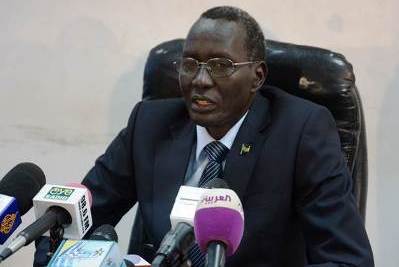South Sudan says oil shutdown is in breach of cooperation agreement
July 23, 2013 (JUBA) – South Sudan warned on Tuesday that the Sudanese government’s decision to halt the flow of crude oil was “unjustifiable and a “material breach” of the September 2012 deal signed between the two countries.

“This unilateral decision by the government of Sudan to stop the flow of the oil to the international markets is unjustifiable and it will affect the oil investment climate, Dau told journalists.
He explained that he received a letter dated 9 June by the Sudanese government, notifying his administration about its decision to stop receiving, processing and transporting crude oil produced from South Sudan within 60 days of receipt of the letter.
“They sent us a letter on 9 June which we responded on 11 June 11 stating that the decision to suspend the oil agreement between the two countries and shutting down of the processing and transportation facilities is a material breach of the oil agreement. According to the oil agreement, suspension can only happen for reasons that are technical or economically non sustainable. So this decision is unjustifiable”, said Dau.
He said that despite assurances of his country’s “unwavering commitment” to fully implement the cooperation agreement and all of its constituent agreements “in good faith”, including mechanisms for implementation, monitoring, evaluation and dispute resolution, Sudan still refused to accept calls for dialogue even after the high level delegation led by vice-president Riek Machar visited Khartoum on 30 June.
“Instead, the government of Sudan on 7 July wrote yet another letter, this time to the companies operating the processing and transportation facilities in Sudan reminding them that the full shut down for oil produced from the territory of the Republic of South Sudan is to be completed on 7 August. This has left us with limited options on how to find a lasting solution to the issue”, Dau explained journalists at the news conference.
He said the circumstances had forced his ministry on 21 July to instruct all oil companies operating in the country to shut down the production of crude oil in sufficient time so as to avoid any environmental hazard to either of the two nations.
Meanwhile, a letter written by the ministry of foreign affairs and international cooperation, asking for a reversal of the decision, had also proven unsuccessful, Dau said.
The minister also warned that Sudan’s decision to block the flow of South Sudan’s crude oil to the international markets through its territory would have negative economic consequences for both countries.
The two Sudans have so far failed to resolve most of the contentious post-secession issues that have thwarted stability in the region since the South won its independence in July 2011, taking with it the majority of the once united territory’s oil wealth.
REDUCTION IN PROGRESS
Dau revealed at the news conference that his ministry had on 16 July started reducing production from 200,000 barrels a day to 120,000 barrels a day after receiving notification from the Sudanese government.
“The reduction is now in progress in block 3 and 7 in Upper Nile state, which has the highest number of wells. Block 1, 2 and 4 and block 5A are not very critical and may start closing down by 25 July 25. This block has only eight wells running. Block 1, 2 and 4 has 100 wells running”, said Dau.
He also pointed out that closing down oil wells during the rainy season is more difficult as it involves heavy trucks used for flushing the flow lines and water tanks, which can be difficult to manoeuvre on the region’s muddy roads.
He said the crude oil which his country had produced and sold in June includes 1 million barrels of oil, while an additional 2.2 million barrels of oil produced so far in July have also been sold.
Another 3.2 million barrels projected for production and sale in August would not be affected by the shutdown because the line fill would be sufficient to cover sales.
(ST)
